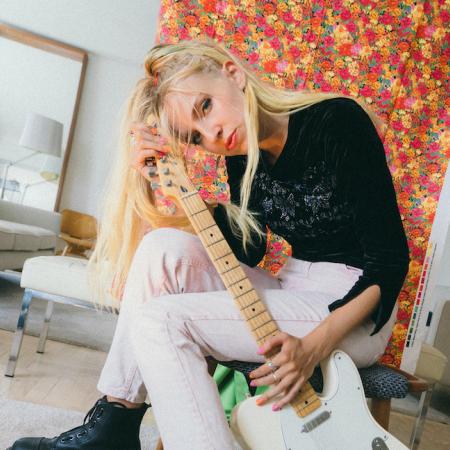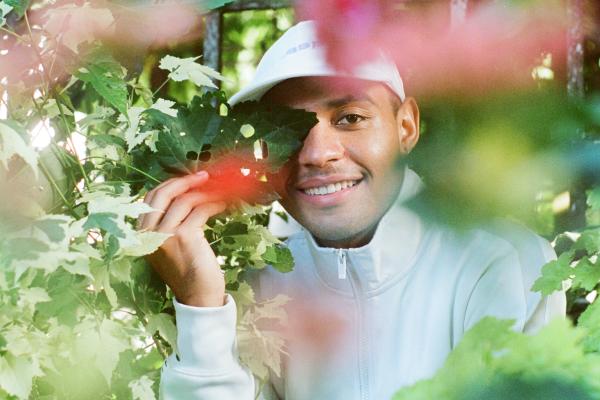"I'm jealous that you're in New Zealand," says Lucas Hedges wistfully, "I've never been but I imagine it's like paradise." Unintentionally adding insult to injury, I inform him that production company A24 (whom he spent his teenage years coming of age for in the likes of cult favourite films such as Greta Gerwig's 'Ladybird', 'Waves', and Jonah Hill's 'Mid-90s') are currently shooting a horror film on location here. He hollers down the phone with mock indignation as he sadly processes the news, "You're kidding! What movie? NO!!! That sounds fun! I want in!! NOW!!!" And whilst I too wish for Hedges a trip to New Zealand one day, as well as a future in which all of his hopes and dreams come true (he has writing and singing ambitions, but more on that later), a more immediate course of action presently revolves around appreciating Hedges' deadpan comedic talents opposite Michelle Pfeiffer in 'French Exit' - director Azazel Jacobs' film-adaptation of critically acclaimed author Patrick deWitt's most recent novel, which tells the tale of down and out Manhattan socialite Frances Price and her codependent son Malcolm, forced to transplant their insular lives to a borrowed apartment in Paris.
Best known for his Oscar-nominated performance in 'Manchester By The Sea', as well as a starring role in 'Ben Is Back', and supporting role in 'Three Billboards Outside Ebbing, Missouri', Hedges felt ready for something more unconventional. "As an actor, a lot of the projects I’ve been part of closely resemble the real world we live in," he reflects. "But 'French Exit' is a stylised world. I was excited to get into that. It’s a different texture. You’re getting a look into a really weird mind, which is Patrick's. And I love that it’s weird. I don’t think we see enough stylised worlds that aren’t some kind of imitation of a Wes Anderson film. This is a movie that I feel deeply connected to, because it’s a testament to what the human imagination can create."
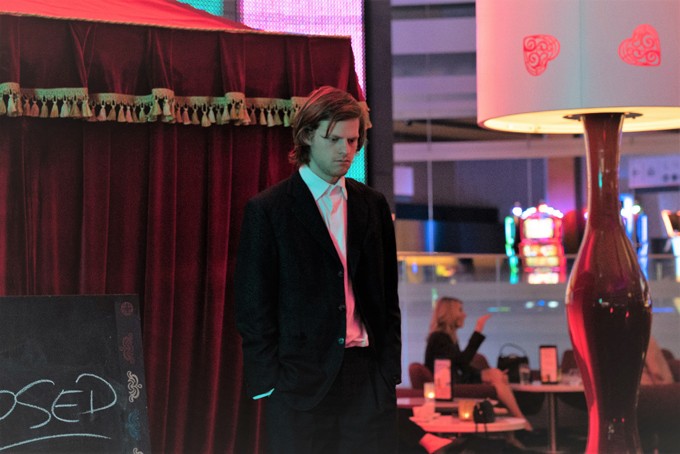
When casting Hedges' character Malcolm, director Jacobs knew he needed someone who could hold their own against the scene-stealing Pfeiffer. He remembers wondering, "Who could be her son, not just looks-wise but energy-wise? To be so curious and hungry - that’s rare in a young actor." And as for Pfeiffer herself, she says about Hedges, "He’s incredibly mature and grounded. Really smart and thoughtful. And he’s fun, too. We had a lengthy rehearsal period, so we were able to get to know each other. And I just felt very maternal toward him." She laughs, "More so than, frankly, Frances does."
Contemplating the strange bond between his and Pfeiffer's characters, Hedges shares: "I don’t think they live very fulfilling lives but they manage to get by on just each other’s company. And they’ve sort of settled for that. Malcolm’s had a really weird childhood: His parents weren’t in his life. So he went from having nothing to having this very charismatic woman who refuses to play by the rules. And I think he gets swept up in awe of his mother. I don’t know if he’s able to fathom a life outside of her orbit."
Coup De Main spoke to Lucas Hedges about the offbeat world of 'French Exit', his search "for people to laugh with and have fun with", emotional intelligence, different kinds of love, the important value of friendships, and more...
...the best compliment I could give a person is that it's just an honour, and beautiful, to witness them live their life.
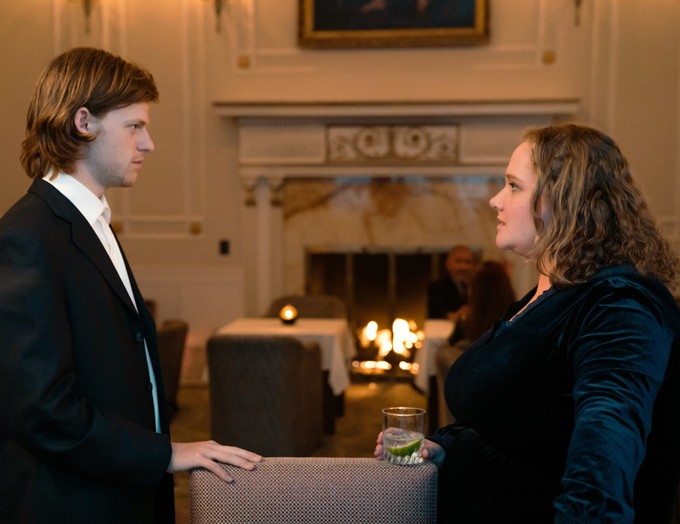
CDM: In the opening scene of the film, Frances asks a young Malcolm: "What do you wanna do?" If there were no limitations on you right now, what would you want to do after this call?
LUCAS: If I could do anything? If there's no Covid, that would probably be the biggest thing, it would be to go a huge dance party in Washington Square Park where nobody had any coronavirus and we could all not wear masks and everybody could do whatever they wanted. That would be fun, probably.
CDM: I read that when you're preparing for a role, you like to write yourself a letter before going to bed and then will discuss with your dream coach your dreams from that night, who will help you interpret how the movie reminds you of your own life? Did you do this process for Malcolm? What did you learn about yourself?
LUCAS: I did do that process with Malcolm. I did this retreat before I went to film, and I created a ton of drawings. I did these collages that I felt represented his feelings. I don't remember the dreams, but I did spend a lot of time connecting to his energy before going to film. And at the end of the day, I have no idea what I learned - I thought I learned a lot when it was happening, and then when I showed up on set, it all went out the window. I find that as an actor, a lot of times the preparation I do is completely meaningless. So I sort of don't know what to do in terms of prep these days. I think the only thing that really matters in the end is that I just show up, and that I want to be there - the experiences where I want to be there, I do a better job in.
CDM: That kind of reminds me of the therapy idea of writing letters to people to say what you need to say, but burning them, or just not sending them. It's more just to get closure from the process of it.
LUCAS: Yes! That resonates. I think there's another piece though with actors, that as an actor, I feel like there's nothing necessarily really concrete about what I do. And I think a lot of actors, myself included, have a tendency to work much harder than we have to in order to convince ourselves that our jobs are real.
CDM: Aside from your letters to yourself, do you also write for pleasure?
LUCAS: I do. I write on and off. I try to write stories, and to varying degrees of success, and by success I mean, like... I've never finished a story, I just have millions of stories I'm starting to write.
CDM: Could you ever see yourself publishing any of them?
LUCAS: Yeah, I would like to. I just have to finish them.
CDM: Please do. I want to read one.
LUCAS: Thank you. I think it's something that'll happen with age more. At least that's what I'm telling myself right now. I mean, it's not really up to me whether or not they get published, but I hope my name as an actor will apply some pressure.
CDM: Azazel Jacobs has said that he used to think of the socialite pages of The New York Times as akin to science fiction. It's been really noticeable over the last year how the pandemic has affected different socioeconomic classes, and the divide between rich and poor, especially how the wealthy have continued to go on expensive holidays around the world. How do you think Frances and Malcolm would have coped with the events of the last year?
LUCAS: Oh man, I think their life would be the exact same. I think they'd be more paranoid, or I think Francis would be, but the way that they live already is so isolated, it's like they're already in quarantine. So I don't think it would be that different, but I think it would heighten their sense of connectivity to each other, and possibly paranoia and disassociation with the outer world.
CDM: My favourite thing about the film is the real kinship of these various lonely people managing to find each other in the world and giving each other some comfort. As we grow older, do you think it gets harder to make new friends?
LUCAS: Hmmm... That's interesting. I don't know. I mean, I wish I could tell you, I feel like I am still so young, so I feel like I haven't grown old enough to fully answer that. But I will say that I'm not really looking for people to step into my life in a major way. And I don't really need friends. But I will also say that at this point in my life, I'm constantly looking for people to laugh with and have fun with, but I feel like the people at the centre of my life are pretty solid/solidified. I don't really know how to answer other than that.
CDM: You can come back to me in ten years.
LUCAS: Okay, cool.
CDM: Madame Reynard, one of Frances and Malcolm's new acquaintances, says: "I believe that friendship is a greater force for good than any religion ever was." Do you agree or disagree with her?
LUCAS: Oh yes, completely. I think that any meaningful religion is probably founded on principles that more resemble friendship than they do God. I think that a lot of religions have been very misinterpreted, and I wasn't around for their founding, obviously, but I do think that there are beautiful teachings in those religions. I think that friendships are much, much more valuable, and they're more real than religion.
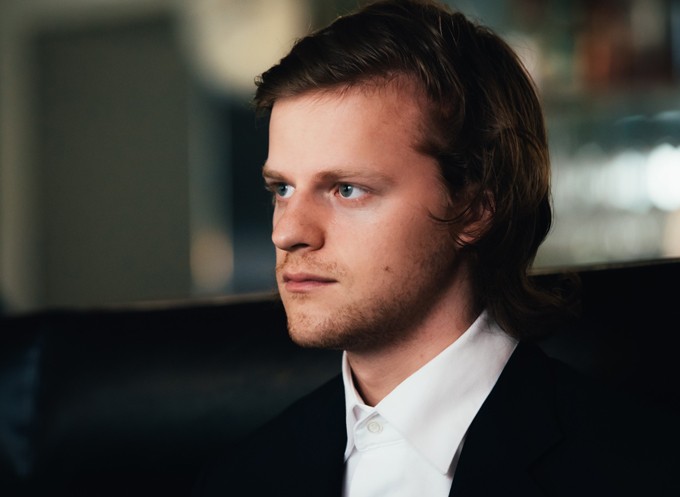
CDM: Frances writes in a note to her friend Joan: "I've always admired your heart, your heart is the rightest of all." Is that maybe the best compliment you can give a friend? That you admire their heart?
LUCAS: Yeah, maybe this is the same thing. I feel like the best compliment I could give a person is that it's just an honour, and beautiful, to witness them live their life. And maybe there are similar themes, but I like compliments that are more specific to why somebody is special than just somebody having a good heart.
CDM: What would be the best compliment that one of your friends could give you?
LUCAS: I think this is true for everybody, but the notion that nobody speaks to them the way that I do. Just something that acknowledges the unique person that I am and that there's something that I can offer them that nobody else can. I mean, that can also go totally in the wrong direction because it can become codependent and narcissistic, but I do think there's something to being seen as singular that I would like to be received as.
CDM: Yeah, and there's something really special about how empathy is just on a different level between best friends.
LUCAS: Mmm-hmm. Totally.
CDM: Madame Reynard also says to Malcolm: "Do you ever feel that you have had adulthood thrust upon you at too young an age and that you're still essentially a child mimicking the behaviours of the grownups all around you so they won’t uncover the meagre contents of your heart." Is that a sentiment that has ever resonated with you?
LUCAS: Yes, it does resonate with me. I think it resonates with me a lot. I feel like a mixture of a child who has no business being an adult, but I also on the other hand feel more capable than ever. But I think that pretty much everything Patrick says resonates with me; he's one of my favourite writers.
CDM: Are there any specific situations or instances that you've found yourself in where that sentiment particularly resonated with you?
LUCAS: When I see people who work very traditionally, like nine-to-five jobs, I feel sort of confused. There's just something jarring about the difference between what my life is and theirs. And I feel like there's also something that feels traditionally grown-up about their lives that feels similar.
CDM: Frances says she likes the sound of sharpening knives, and Malcolm seems to find some comfort in the sound of his bike bell. Is there any specific noise that you find helps calm you down or that you just really enjoy?
LUCAS: I like the sound of typewriters.
CDM: Do you have one?
LUCAS: No, but I had one as a kid. I liked the sound of it. I don't know if I like other sounds. I like music, but that's not really a sound.
CDM: What music do you like listening to?
LUCAS: I like this guy, Gus Dapperton. I think he's really great. I like Future Islands. I like Brian Eno. It's hard for me to answer that question because I like so many kinds of music, but those are some.
CDM: Malcolm's girlfriend Susan says: "I want you to know that I am trying to fall out of love with you." Is love an action or a feeling? Is it something you choose to do? Or unconscious?
LUCAS: I think there are many different versions of it. Love can be something you show by doing an action, and that is very loving. And then there's a kind of love that we don't choose - like, we don't choose who we fall in love with and we don't choose our best friends. We can, but I think if we chose them, that love would probably die out pretty soon. So I think that there are many different forms of love, and I also think there's a kind of undying love that lives in all of us that is what sustains us and doesn't have anything to do with anybody else. But when it comes to that quote of Susan's, trying to fall out of love with you, I don't even think she's referring to love, I think she's just trying to wake him up, just trying to be like, 'Just so you know, the way you're treating me is making me hate you so I want you to know that.'
CDM: Has your perception of what love is changed as you have grown older?
LUCAS: Very much. I saw it as something that was much more codependent as a kid, and now I see it as being more, like I said, something that we're given. Again, I don't choose which people move me more than anyone else. I don't choose which actors I love. But that that love is something that I'm trusted with and it's something I have to protect.
CDM: What does love mean to you?
LUCAS: I think it's life force. It's my life force. It's what I move with. It's what I need to survive.
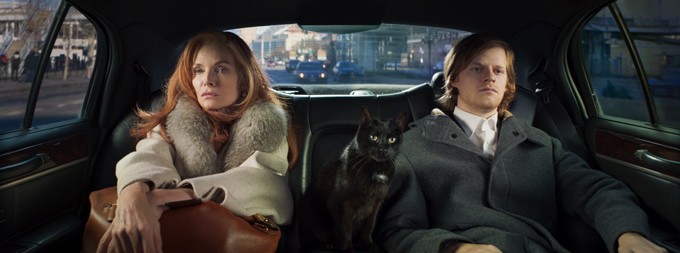
CDM: Frances describes Malcolm's father as an "emotional moron". Emotional intelligence is an important life skill but not something you learn at school as such. Should there be more of an emphasis placed on the importance of emotional intelligence by society?
LUCAS: Yes, I do think so. I'm trying to think of how that would be taught. I think the solution to that is having adults who are more emotionally aware. There are a lot of teachers who leave their emotions, who are very divorced from who they are and from their emotions, and I think the more connected a teacher is with who they are, it becomes inherently a part of the lesson. But I don't know if it's something that has to be directly taught as much as it does need to be something that us adults need to have in the beginning. I had the thought today that I don't think that kids are the ones who need our help as much. I think that kids actually are the ones who just need not to be fucked up. Adults are the ones who need to get their shit together. Kids have everything they need to function, at the level they can function at.
CDM: It's interesting, because adults are meant to be the ones looking after kids.
LUCAS: Yeah exactly. So I think a lot or most of the time, kids end up looking after the adults, with some exceptions, but I think the kids who aren't the kids who are looked after too much are the ones who end up needing to be taken care of too. So kids, really I think they need to be left alone more, to be honest. But maybe I'm just speaking about my childhood.
CDM: Also weird because historically you have children so that they can look after you when you're old.
LUCAS: Yeah, it's very true.
CDM: Malcolm says to Frances, "You're being a dick," when she is being rude to Madame Reynard. Is it important to have people in your life who are not afraid to call out bad behaviour?
LUCAS: Yeah, I think it's very important. It's fundamental to a good life. But I think if you're a dick, then people will tell you in one way or another, so I think it's impossible for the message not to be received unless you're some celebrity who lives completely divorced from reality. But at that point, those people are desperate to have a honest hand steady them. I think it's very important.
CDM: Is there anything or anyone in your life in particular, that helps keep you grounded?
LUCAS: The only thing that keeps me grounded is following my dreams. For a while, I thought it was meditation, but meditation is a tool; it's not something that provides calmness in the mind and it's not something that can ground you. I just listen to what I want to experience in my life, and that's the grounding I need.
CDM: What are the top items on your bucket-list that you want to achieve?
LUCAS: I don't know. I have no idea. I wish I could answer that. I want to... I just want to write more, and sing hopefully; I haven't done that much.
CDM: Would you like to release music professionally?
LUCAS: That's TBD. I have no proof that that's going to happen anytime soon, but I'm open to that; if I was good at it.
CDM: I feel like I've just learned about all of these projects that may or may not happen in the future... and I'm excited to see if you release a book or album one day!
LUCAS: Thank you! I appreciate that.
'French Exit' is out in New Zealand cinemas now - watch the trailer below:



